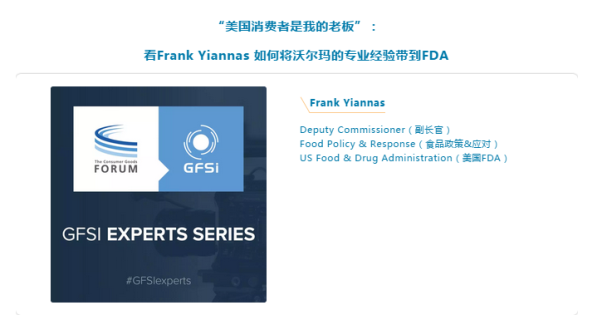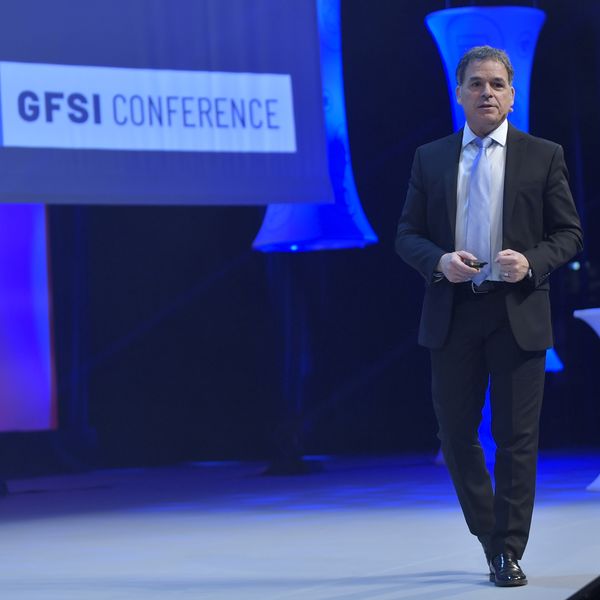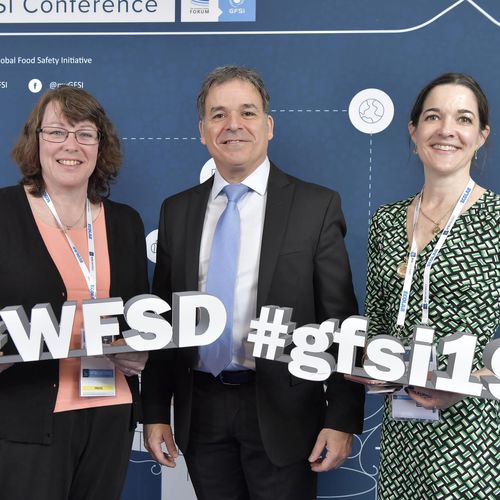"My Boss Is the American Consumer 美国消费者是我的老板"

This week's episode of the GFSI Experts Series features one of the founding figures of our current understanding of food safety culture: Frank Yiannas, Deputy Commissioner of Food Policy & Response at the US FDA. A microbiologist by training, Frank nevertheless contends that behavioural science is as critical as 'hard science' to the development of successful food safety systems, a position he defended in his seminal text Food Safety Culture: Creating a Behaviour-Based Food Safety Management System.
本周的GFSI专家系列栏目介绍了我们目前所理解的食品安全文化的奠基人物之一:美国FDA食品政策&应对部副长官Frank Yiannas。作为一名训练有素的微生物专家,Frank认为行为科学对成功的食品安全体系的发展和“硬科学”一样重要,他在开创性的著作《食品安全文化:创建基于行为的食品安全管理体系》(Food Safety Culture: Creating a Behaviour-Based Food SafetyManagement System)中捍卫了这一立场。
Frank's current role at the FDA follows a ten-year career at Walmart, where he led the charge in encouraging US retailers to adopt GFSI standards. This private-to-public shift gives Frank a unique perspective on cross-sector partnerships to promote food safety. During the GFSI Conference 2019 in Nice, he sat down to explain this perspective and the industry-informed strategy he is bringing to the FDA. Watch this conversation on GFSI Youtube, where you can subscribe to catch every new installment, or read the transcript below.
在得到目前在FDA的职位之前,Frank在沃尔玛工作了10年,期间他带头鼓励美国零售商采用GFSI标准。这种从私营部门到公共部门的转变使Frank对促进食品安全的跨部门合作伙伴关系有了独特的看法。2019年在法国尼斯举行的全球食品安全倡议大会上,他解释了他的这一看法以及他向FDA提出的行业知情战略。您可以在GFSI Youtube上观看这段对话,并订阅观看每一期新文章,或者阅读下面的文字记录。
This interview was conducted by Barbara Van Renterghem, Ph.D., for Food Safety Magazine onsite at the GFSI Conference in Nice, France. Watch this episode from the GFSI Experts Series or read the interview below.
本次采访由Barbara Van Renterghem博士在法国尼斯全球食品安全倡议大会现场为《食品安全杂志》(Food Safety Magazine)主持。您可以观看这一期GFSI专家系列栏目(视频链接https://v.qq.com/x/page/i0867udm5dg.html),或者阅读下面的采访。

Barbara: As someone who has been in the private sector, what is it like to now play the role of regulator?
Barbara:作为一个在私营部门工作过的人,现在成为监管者的角色,感觉怎么样?
Frank Yiannas: I'm enjoying my time at FDA. I've been there two and a half short months. I entered during the midst of the government shutdown, and that was an interesting experience for me, but I'm enjoying the important role and the responsibility that it brings. It's quite different, the way you approach food safety in the public sector, but there's a lot of similarities as well. Whether I was working for a big brand, the world's largest retailer, or now for a very important regulatory agency, at the end of the day I understand that I'm still working for the same boss, and that's the American consumer.
Frank Yiannas: 我在FDA过得很愉快。我已经在那里待了两个半月了。我是在政府关闭期间加入的,这对我来说是一次有趣的经历,但我很享受它给我带来的重要角色和责任。公共部门处理食品安全的方式非常不同,但也有很多相似之处。无论我是为一个大品牌,世界上最大的零售商工作,还是现在为一个非常重要的监管机构工作,最终我理解我仍然在为同一个老板工作,那就是美国消费者。
Barbara: Do things move as quickly at the FDA as what you were able to do at Walmart?
Barbara: FDA的工作是否像你在沃尔玛时做到的那样快?
Frank: Whether you're in the private sector or the public sector these days, everyone wants to act like a startup. The reality is the world around us is moving very fast. The private sector has challenges; it's moving really quickly, especially these big organisations. Those challenges exist in the public sector, but we are working more rapidly today than ever before. Here's a perfect example. As you know, the FDA has the responsibility to respond to outbreaks. Last year, we saw two outbreaks associated with romaine lettuce. After the first outbreak, it took quite a bit of time to get our outbreak investigation report out. It took us almost nine months. After the most recent outbreak that occurred in the fall, we were able to get the report out one month to the day after CDC officially declared the outbreak over. So we are making every attempt to work faster, and I think we're doing a pretty good job of it.
Frank: 无论你现在是在私营部门还是在公共部门,每个人都想要像初创企业一样行事。现实是,我们周围的世界正在飞速发展。私营部门面临着挑战;它们行动非常迅速,尤其是这些大型组织。这些挑战也存在于公共部门,但我们今天的工作比以往任何时候都更加迅速。这里有一个完美的例子。如你所知,FDA有应对疫情的责任。去年,我们看到了两起与长叶莴苣有关的疫情。第一次疫情爆发后,我们花了相当长的时间才发布疫情调查报告,将近九个月的时间;在秋季最近一次疫情爆发后,我们能够在疾控中心正式宣布疫情爆发结束后的一个月内发布报告。所以我们正在尽一切努力加快工作速度,我认为我们做得很好。
Barbara: You have been an ardent supporter of blockchain technology. Does that remain a priority at FDA?
Barbara: 您一直都是区块链技术的热心支持者,那么区块链在FDA也仍旧属于优先项吗?
Frank: Yes. I'm delighted to see that GFSI is putting such a focus on the importance of traceability and transparency, maybe enabled by blockchain, and I'm happy that I had a role to play in elevating the conversation. After 30 years in the profession, one of the things I realised is that an Achilles heel in today's food system is a lack of traceability and transparency. Transparency is the equivalent of shining a light on the food system that would hold people accountable and in turn encourage them to behave more responsibly. It was a big portfolio of mine. I spent the past two years digging deep into what distributed ledger technology means and how it can enable a new era of food traceability. At FDA, I have the same interest and the same mandate. You will be hearing more from me and the agency on what we're doing to try to promote greater traceability in the food system with new and enabling technologies such as blockchain.
Frank: 是的。我很高兴看到GFSI能够关注到可追溯性和透明度的重要性,可能是通过区块链来实现的。我也很荣幸能够参与其中,促进相关对话。从事这一行业已有30年,我如今意识到当前食品体系的一个致命弱点就是缺乏可追溯性和透明度。透明度就等同于食品体系的指明灯,能让人们意识到其所担负的责任,进而鼓励他们行事更尽责。这也是我大部分的工作职责。我在过去的两年内深入研究了分布式账本技术的方法以及这种技术是如何开创食品可追溯性的新时代。在FDA,这既是我的兴趣所在,也属于我的任务。接下来你们将会听到更多关于我和FDA如何努力运用新兴可用技术(例如区块链)来提高食品体系可追溯性的消息。
Barbara: How will you use your opportunity to shape food safety culture across the whole supply chain?
Barbara: 您将会如何利用所面临的机遇,在整条供应链中打造食品安全文化呢?
Frank: Whether you're in the public sector or the private sector, and certainly when you're working in large organisations like large retailers or the FDA, your job isn't to create better food safety programmes. It isn't necessarily to write better rules or policies. It's really how you influence the behaviours of the millions of people that work in the food industry. And at the end of the day, that results from understanding organisational culture and principles of human behaviour. Some of those techniques I have full intention of employing in the public sector, because it leads to the same outcome. Food safety culture is a prerequisite for food safety management systems. And if you don't have strong food safety culture, you can have the best rules and policies in the world — but if people aren't going to follow them, it's meaningless.
Frank: 无论你是在公共部门还是私营部门,当然当你就职于大型零售商或FDA等大型机构,你的工作并不是创立更好的食品安全项目,编写出更好的规则或制度并不是必需的选项,真正重要的是如何影响数百万从事食品行业人士的行为。归根结底,是要理解组织文化和人类行为原则。我将在公共部门内采用其中一些会带来相同结果的技术。食品安全管理体系的前提条件是食品安全文化。如果没有强大食品安全文化的支持,就算拥有世界上最好的规则和制度 - 如果没人遵守这些规则和制度,那又有什么意义呢?
Barbara: How will you elevate knowledge and influence consumer culture around food at FDA?
Barbara: 那么在FDA,您将如何提升食品方面的知识并影响消费者的食品文化呢?
Frank: That's a great question. It's one I've already been engaged in during conversations with our staff. We're going to do more in the area of consumer food safety education. Let me be clear: I believe that the best scenario is when the food industry tries to produce products that are contamination-free. "Just cook it" is an old paradigm. We have to strive to continue to remove pathogens from the food supply. But the reality is that there's a shared responsibility for food safety along the entire continuum from farm to home, and we need a strong food safety culture. Some of that is making sure that consumers know the safe practices that they should follow at home to protect their loved ones, friends and family. We're going to be redoubling our effort, and you'll see more from us in the way of consumer food safety education.
Frank: 这个问题问得很好。这一点是我与员工沟通时一直强调的。我们打算加大消费者食品安全教育的力度。说得更清楚一点就是:我认为最好的情况是食品行业尽力产出无污染的产品。“只管煮吧”(Just cook it)属于老旧模式。我们必须继续努力消除食品供应中的病原体。但现实情况是整条供应链(从农场到家庭)中,我们负有共同的食品安全责任,并且需要打造强大的食品安全文化。我们采取的一些措施是:确保消费者意识到他们应该在家遵循的安全措施,来保护他们的亲人、朋友和家人。我们将加倍努力,将来你们会看到我们在消费者食品安全教育方面所做的更多努力。

Barbara: How do you plan to increase adoption of GFSI standards in the United States?
Barbara: 您计划如何提高美国对GFSI标准的采用度?
Frank: There's work to be done. I'm very happy to say that the improvements and progress made by GFSI over the years are really impressive, if you look back to when it was formed in the early 2000s primarily by European groups. In 2007, there was a major breakthrough when a few retailers came together and agreed that they were all going to require their suppliers to become GFSI-certified. I happened to be working for one of those retailers. It was the only US retailer that was part of that group. In 2008, I was behind an important letter that went out to the industry in the US asking for GFSI adoption. I think real opportunities reside between the public and private sector to further harmonise what these third-party certifications mean. For the FDA, Congress has given us a mandate. We recognise and use these certifications in our import strategies. But I think we need to look at this new era of public and private partnership, when resources around the world are shrinking. We will be creative in how we do that, but it's a two-way street. I think when I was on the other side of the fence, in the private sector, we always wanted government to recognise private schemes. Now that I'm on the other side of the fence, I realise that the private sector has to step up and do some things, too, such as: are they really committed to sharing data? Are they really committed to continuing to improve their private schemes and standards so they align with the strictest of regulatory authorities? For example, in the US, sometimes these schemes have to do addendums to comply with FSMA. There's work to be done on both sides, but we are fully committed to working with the private sector to strengthen public-private partnerships.
Frank: 还有大量的工作等着我们去做。如果回顾一下21世纪初GFSI刚成立时,主要成员是欧洲团体,你会发现GFSI这些年来的改善和进步确实令人印象深刻。GFSI在2007年取得了一项重大的成就,当时一部分零售商举行会议,决定要求他们的供应商获得GFSI认可的认证。当时我碰巧在其中一家零售商工作,它正是当时唯一一家参与该组织的美国零售商。2008年,我写了一封致美国食品行业的重要信件,希望采用GFSI标准。我认为公共和私营部门之间进一步协调的真正机遇在于运用第三方认证的方法。至于FDA,国会给我们下达了一项指令,在进口战略中承认并使用这些认证。我认为当全球资源日益萎缩时,我们需要关注这个公私合作的新时代。虽然我们可以在如何完成任务方面创新,但这是一条双行道,不能只顾一方。如果我站在另一边,即私营部门的立场上,我们一直希望的是政府承认私有项目。现在既然我已经站在另一边的立场上,我认为私营部门也必须有所作为,例如:是否真正愿意共享数据?是否真正致力于继续改善其私有项目和标准,以便与最严格的监管机构保持一致?例如,在美国,这些项目有时必须添加附录以便符合《食品安全现代化法案》(FSMA)的规定。公共部门和私营部门都需要完成很多工作,但我们将尽全力加强与私营部门的合作以及公私合作伙伴关系。
Barbara: I think you have your work cut out for you, Frank.
Barbara: Frank,我想已经有大量的工作在等着你。
Frank: It's going to be an interesting time, but I'm very excited about the future and surrounded with some great people at FDA. I would say that the future of food safety is looking pretty bright.
Frank: 这将会非常有趣,我对未来也是翘首以待,尤其是为能与FDA的优秀人士共事而感到非常兴奋。我相信食品安全的未来无比光明。
Barbara: Thanks for talking with me.
Barbara: 好的,非常感谢您接受我的采访!
Frank: My pleasure.
Frank: 乐意之至。






